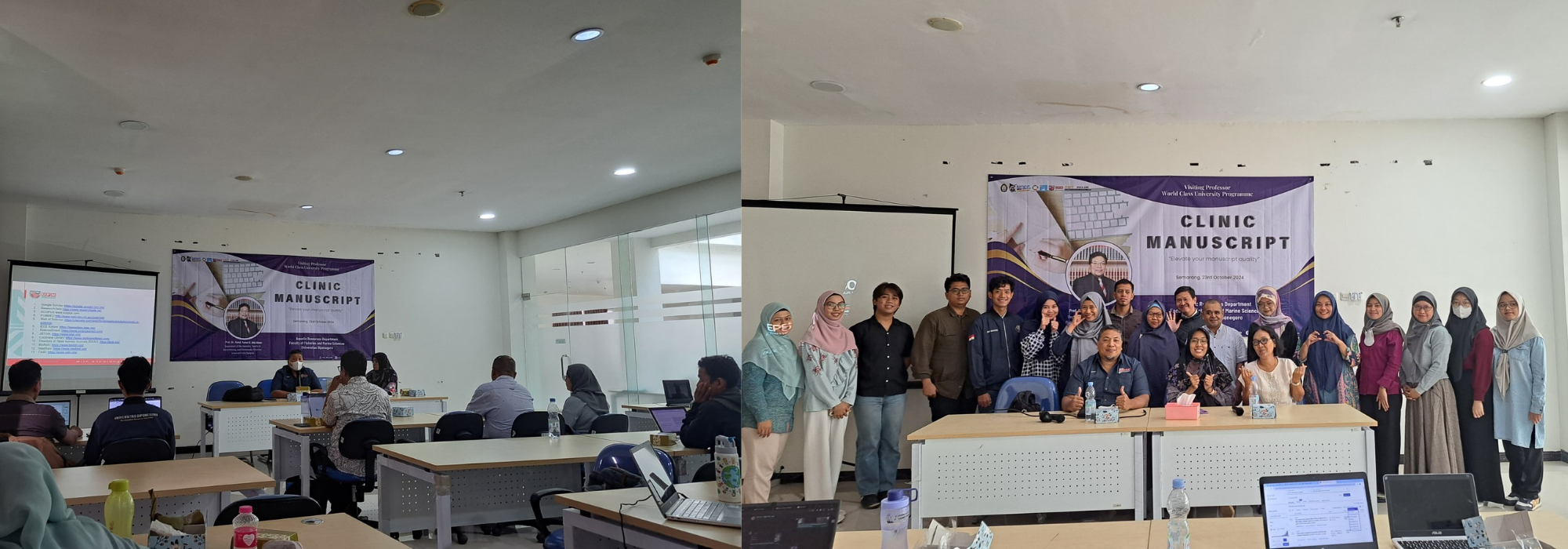Diponegoro University (Undip) was ranked 791-800 in the QS World University Rankings 2024. To realize its mission of becoming one of the top 500 universities globally, several strategic improvements are necessary, with a focus on enhancing academic reputation. A strong academic reputation is essential for educational institutions to remain competitive in the global market, as research excellence serves as a key driver of competitiveness. It helps institutions boost their reputation, secure funding, attract talented students and faculty, and improve overall academic performance.
High-quality research outputs by scholars significantly contribute to institutional rankings, with each publication featuring the university’s affiliation, thereby increasing visibility and recognition. Many universities engage in strategic efforts to enhance their image and position themselves competitively in the education sector, and Undip is actively pursuing this objective. Through its *World Class University* (WCU) program, Undip aims to enhance its academic reputation by increasing the number of international faculty members, fostering collaborative research, and expanding its global partnerships.
As part of the WCU program, the Department of Aquatic Resources is initiating a research collaboration with the Department of Biochemistry, Faculty of Biotechnology and Molecular Sciences, at Universiti Putra Malaysia (UPM), under the guidance of Professor Moh Yunus bin Abd Shukor. UPM, currently ranked 158th in the QS World University Rankings 2024, provides an excellent platform for Undip to strengthen its international standing and progress in global rankings.
This collaboration is led by Dr. Diah Ayuningrum, S.Pd., M.Si., who holds a Scopus H-index of 9, has published eight articles in Scopus-indexed journals, and authored four ISBN-registered books. Professor Moh Yunus, the invited expert from UPM, has published 200 articles in Scopus-indexed journals, accumulated 3,897 citations, holds an H-index of 35, has been awarded 16 patents, and received 20 international awards.
The visiting professor program features several academic activities, including guest lectures, public lectures, manuscript clinics, and collaborative research sessions. It also involves discussions aimed at establishing a Memorandum of Understanding (MoU) between Undip and UPM. These activities are taking place at the Faculty of Fisheries and Marine Sciences (FPIK), Undip, from October 21 to 25, 2024.
The first event was a public lecture held on October 21, 2024, where Prof. Moh Yunus shared insights into microbial biotechnology, focusing on its role in bioremediating pollutants in aquatic environments. The lecture attracted around 150 participants, including students (undergraduate, master’s, and doctoral levels), faculty members, researchers, and external guests.
Figure 1. The general lecture participant
A participant praised the lecture, stating:
“The presentation was clear, focusing on downstream biotechnology applications for remediating polluted mangrove and aquatic environments. Despite the lecture being in English, Prof. Moh Yunus made the content accessible through visual aids such as illustrations, graphs, and mathematical models. His clear language ensured that even participants with limited English proficiency could follow the discussion effectively.”
The second event featured a guest lecture as part of the Pengantar Bioteknologi Akuatik Class for undergraduate students in the Water Resources Management (MSP) program held in Tuesday, October 22nd, 2024. This session encouraged active communication in English and provided insights into microbial biotechnology’s application in aquatic pollution remediation.
One student reflected:
“The speaker offered valuable tips on using AI tools effectively and shared alternatives to Mendeley for managing bibliographies and citations. The practical demonstration on scientific writing was particularly insightful, making it easier to grasp the process of drafting papers based on credible sources. The relaxed delivery style also made the session more engaging.”
Figure 2. Guest lecture in Class Pengantar Bioteknologi Akuatik
The third activity, a manuscript fine-tuning session, included five participants from the master’s and doctoral programs in aquatic resource management. One participant commented: ” I am delighted with the results of the fine-tuning of manuscripts I have carried out. The process of sharing knowledge over the past 2 days was very professional and detailed and opened my horizons. Prof. Shukor was very helpful and significantly improved my writing, structure, grammar, and flow of the research without losing my original voice as the original researcher. Thanks to this fine-tuning, my manuscript is now much more ready for publication. I highly recommend Prof. Syukor to improve our written work. Hopefully, in the future, we can meet him again with different topics. Have fun writing!!!.”
Figure 3. Fine tuning manuscript attendee
The fourth and fifth activities—focused on manuscript writing and the use of VOSviewer—were held on October 23, 2024, with 20 participants. A participant shared: “The session on VOSviewer was particularly insightful, as it introduced new ways to summarize scientific articles, especially from Scopus-indexed sources. This knowledge will help me better develop the background and key ideas for my research project. Even though I arrived late, the material was easy to follow, and I still gained valuable insights.”
In addition to these academic activities, a Memorandum of Agreement (MoA) between Undip and UPM was initiated, laying the foundation for future collaborative research and facilitating student and staff exchanges between the two institutions.
 Figure 5. The discussion of possible MoA between UPM and Undip
Figure 5. The discussion of possible MoA between UPM and Undip
The ultimate goal of this visiting professor program is to advance the downstreaming of enzyme products for the bioremediation of microplastics, utilizing marine microbial metabolites. This joint research initiative reflects the growing partnership between Undip and UPM, positioning both universities for continued academic and research excellence in the years ahead.





